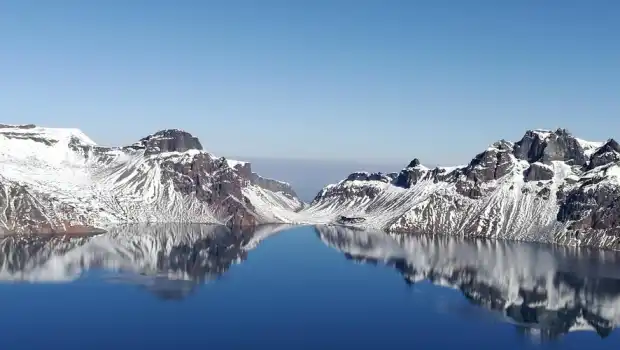
Changbai Mountain: China's Scenic Treasure
1. Location and Overview 🏔️
Location: Changbai Mountain (长白山), also known as Paektu Mountain, is located in the northeastern part of China, straddling the border between China and North Korea. The Chinese side of the mountain is situated in Jilin Province (吉林省).
Overview: Changbai Mountain is renowned for its stunning natural beauty, rich biodiversity, and cultural significance. The highlight of the region is the breathtaking Tianchi Lake (天池), also known as Heaven Lake, which sits in the caldera of the dormant volcano at an elevation of about 2,194 meters (7,198 feet). The area is also home to diverse flora and fauna, including the rare Siberian tiger. Visitors can explore a range of landscapes from dense forests to alpine tundra, making it a paradise for nature enthusiasts.
2. Unique Features 🌟
- Heaven Lake (天池): A beautiful crater lake that is one of the deepest and highest volcanic lakes in the world.
- Volcanic Landscape: The mountain’s volcanic activity has created unique geological formations, including hot springs and fumaroles.
- Rich Biodiversity: The area is home to numerous rare species of plants and animals, making it a key region for biodiversity.
- Waterfalls: The Changbai Waterfall (长白瀑布) cascades down from Heaven Lake, creating a stunning visual spectacle.
- Cultural Significance: The mountain is considered sacred in various local cultures and has historical significance.
3. Seasonal Changes 🌷🌞🍁❄️
Spring (March to May): Spring brings a burst of life with blooming flowers and melting snow, making it a beautiful time for photography and hiking.
Summer (June to August): The weather is mild and comfortable, ideal for outdoor activities and exploring the diverse landscapes.
Autumn (September to November): This season offers cool temperatures and vibrant fall foliage, providing a stunning backdrop for hiking and sightseeing.
Winter (December to February): The mountain is transformed into a winter wonderland, perfect for snow sports and enjoying the serene snowy landscapes.
4. Best Time to Visit ⏰
The best time to visit Changbai Mountain is during summer (June to August) and autumn (September to November). These seasons offer the most comfortable weather and the best conditions for outdoor activities.
5. Travel Tips 🧳✈️
- Advance Booking: Purchase tickets and accommodations in advance, especially during peak tourist seasons.
- Guided Tours: Consider hiring a local guide to gain deeper insights into the area’s natural and cultural significance.
- Dress Appropriately: Wear layers and bring rain gear, as the weather can change rapidly in the mountains.
- Footwear: Sturdy hiking boots are essential for navigating the rugged terrain.
- Altitude Preparation: Be prepared for high altitudes; bring medications if you are prone to altitude sickness.
- Hydration: Carry plenty of water, especially if hiking or engaging in strenuous activities.
- Respect Wildlife: Keep a safe distance from wildlife and do not disturb their natural habitats.
6. Cultural Significance 🎭🏔️
Changbai Mountain holds a significant place in local mythology and history. It is considered a sacred place by the Manchu people and is mentioned in various historical texts. The area also plays a crucial role in the cultural and spiritual lives of the local Korean ethnic minority.
7. Tourist Attractions 📸🏞️
- Heaven Lake (天池): A stunning high-altitude crater lake.
- Changbai Waterfall (长白瀑布): A dramatic waterfall fed by Heaven Lake.
- Hot Springs (温泉): Natural hot springs with therapeutic properties.
- Lvyuan Pond (绿渊潭): A serene and picturesque pond.
- Changbai Mountain North Slope (长白山北坡): Offers beautiful hiking trails and viewpoints.
- Changbai Mountain West Slope (长白山西坡): Known for its diverse flora and fauna.
- Underground Forest (地下森林): A unique forest located below the main plateau.
- Alpine Garden (高山花园): Features a variety of alpine plants.
8. Nearby Attractions 🗺️
- Dunhua City (敦化市): Known for its Buddhist temple and scenic beauty.
- Yanbian Korean Autonomous Prefecture (延边朝鲜族自治州): Offers rich Korean cultural experiences and cuisine.
- Songhua Lake (松花湖): A large and beautiful lake ideal for boating and fishing.
- Wusong Island (雾凇岛): Famous for its spectacular frost-covered trees in winter.
9. How to Get There ✈️🚗🚂
- By Air: The nearest airport is Yanji Chaoyangchuan International Airport (延吉朝阳川国际机场), which has regular flights from major Chinese cities. From Yanji, you can take a bus or taxi to the mountain.
- By Train: You can take a train to the nearby city of Dunhua (敦化) or Antu (安图) and then transfer to a bus or taxi to reach the mountain area.
- By Car: Renting a car is an option if you prefer flexibility. The drive from Yanji to Changbai Mountain takes about 3-4 hours. Be prepared for mountainous roads.
- By Bus: There are direct buses from major cities like Changchun (长春) and Yanji (延吉) to the Changbai Mountain area.
10. Practical Information 💼💰
- Ticket Price: Admission to Changbai Mountain varies but typically costs around 125 RMB (approximately 18 USD).
- Opening Hours: The scenic area is usually open from 7:00 AM to 5:00 PM.
- Free Admission: Children under 6 years old and seniors over 60 years old with valid identification can enter for free.
- Audio Guides: Available for rent at the entrance for an additional fee.
11. Local Cuisine 🍲🥢
- Korean BBQ (韩式烤肉): Enjoy grilled meats and vegetables, a staple in the local Korean cuisine.
- Kimchi (泡菜): Traditional fermented vegetables, often spicy and tangy.
- Jiaozi (饺子): Chinese dumplings filled with meat and vegetables.
- Hot Pot (火锅): A communal dish where diners cook ingredients in a simmering pot of broth.
- Northeast Cuisine (东北菜): Hearty and flavorful dishes such as stewed pork with vermicelli.
- Mung Bean Noodles (绿豆面): A refreshing cold noodle dish often served with a spicy sauce.
- Pickled Vegetables (腌菜): Various locally pickled vegetables that accompany many meals.
12. Precautions to Take ⚠️
- Altitude Sickness: Be aware of the high altitude and take necessary precautions.
- Weather Conditions: Check the weather forecast and be prepared for sudden changes.
- Wildlife Safety: Do not feed or approach wildlife.
- Health Precautions: Bring necessary medications and a first aid kit.
- Respect the Environment: Follow all local regulations and guidelines to preserve the natural beauty.
13. Conclusion 🌟
Changbai Mountain is a treasure trove of natural wonders, cultural richness, and scenic beauty. Whether you’re an adventure seeker, nature lover, or history enthusiast, this destination offers a unique and unforgettable experience. From the tranquil Heaven Lake to the majestic waterfalls and vibrant local culture, a visit to Changbai Mountain is a journey into the heart of China’s natural and cultural heritage. Don’t miss the opportunity to explore this spectacular region and create lasting memories amidst its breathtaking landscapes.

















Comments
Leave a reply